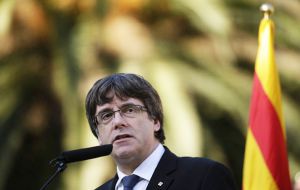MercoPress. South Atlantic News Agency
Catalonia parties meet to decide how to react to Rajoy's announced measures
 As nearly half a million separatists took to the streets of Barcelona, Puigdemont declared Rajoy guilty of “the worst attack on institutions and Catalan people”
As nearly half a million separatists took to the streets of Barcelona, Puigdemont declared Rajoy guilty of “the worst attack on institutions and Catalan people” Catalonia’s separatists weighed their options Sunday ahead of a week that will see Spain take the drastic step of sacking the region’s government as well as calling fresh elections to try and stop the country breaking up.
Catalan leader Carles Puigdemont and his regional executive will be booted out, with Madrid taking control of ministries under unprecedented measures announced on Saturday by Prime Minister Mariano Rajoy.
“Yesterday there was a fully fledged coup against Catalan institutions,” said Catalan government spokesman Jordi Turull.
Catalan parties are due to meet Monday to organize a full gathering of the regional parliament to debate next steps — a session that could potentially give the ruling separatists another opportunity to declare unilateral independence, which they have been threatening to do since a banned referendum on the issue on Oct. 1.
As nearly half a million angry separatists took to the streets of regional capital Barcelona on Saturday, Puigdemont declared Rajoy guilty of “the worst attack on institutions and Catalan people” since the dictatorship of Francisco Franco.
Among other repressive measures, Franco — who ruled from 1939 until 1975 — took Catalonia’s powers away and banned official use of the Catalan language.
Though Catalans are deeply divided on whether to break away from Spain, autonomy remains a sensitive issue in the northeastern region of 7.5 million people. Catalonia fiercely defends its language and culture and has previously enjoyed control over its policing, education and health care.
Spain’s government says it had no choice but to use previously untested constitutional powers to seize control of the region, faced with the country’s worst political crisis in decades.
“What we are doing is following strictly the provisions of our constitution,” Foreign Minister Alfonso Dastis told BBC television.
Madrid could take control of the Catalan police force and replace its public media chiefs, while new elections for the regional parliament must be called within six months.
The Senate, where Rajoy’s conservative Popular Party holds a majority and his approach to Catalonia enjoys support from other major parties, is set to approve the measures by the end of the week.
But political analysts warn that Madrid faces a serious struggle in practical terms to impose control over the region. Potential scenarios include Catalan police and civil servants refusing to obey orders from central authorities.
“What is going to happen if they don’t abide by it?” said Xavier Arbos Marin, a constitutional law professor at the University of Barcelona, raising the prospect of the government trying to “take them out by force.




Top Comments
Disclaimer & comment rulesCommenting for this story is now closed.
If you have a Facebook account, become a fan and comment on our Facebook Page!